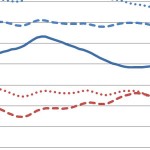Edwards Dances Around the Fact That I’m Right
[This essay first appeared on GoLocalProv.]
It’s tempting to go line by line through the response that Representative John Edwards (D – Portsmouth, Tiverton) made to a recent essay of mine. However, anybody who doesn’t see through his talking points is unlikely to be interested in the back and forth.
The bottom line is that Edwards takes the long way around admitting that my observation — that Rhode Island politicians are driving up the price of energy — is completely correct.
He writes about stabilizing prices, about an expanding renewable energy industry, and about “a guaranteed long-term revenue stream” for such energy.
You know how renewables stabilize energy prices? By making them higher all the time. You know how the government helps to make renewables increasingly common? By subsidizing the industry with taxpayer dollars. You know how government can guarantee long-term revenue for renewables? By forcing energy consumers to pay extra for it.
(Edwards makes a point of opening his essay with an ad hominem, vague, and indirect insinuation that my opinion is related to my employer. Readers should take a look at his campaign donors, with thousands of dollars from construction organizations and unions.)
Fortunately for those of us with little extra time in the day, Edwards squeezes the coal of his deceptive rhetoric into this diamond of a sentence:
While the so-called Center for Freedom and Prosperity would like you to think that renewable energy is inherently more expensive than fossil fuels, if we were producing enough renewable energy right now, the rate hike in question wouldn’t even be on the table.
A lesson in basic economics would show that one product can’t really be “inherently” more expensive than another. It is always, always a question of supply and demand. The basic reality, however, is that renewable energy is unquestionably much more expensive than fossil fuels.
This can be seen simply in the requirement for long-term energy contracts, for which Edwards voted in 2009. The legislation allows National Grid to pass on the higher costs of renewable energy to its customers, as a “tariff” tacked on to energy bills.
With its proposed rates for next year, National Grid is actually expecting that tariff to go down, reducing the total energy increase by 0.37 percentage points. (In other words, the increase would be 24% instead of 23.6% if this tariff stayed the same.)
The reason the tariff is going down is that the cost of traditional energy went up so much. That is, the extra cost for renewables became a little bit smaller, because fossil fuels are more expensive this year. So, yes, if Rhode Island were producing enough renewable energy “right now,” there would be no rate hike on the table, but only because we’d be paying much higher rates already.
Of course, by his “if,” Edwards might mean both more production and lower costs, but that’s a let’s-pretend fantasy. I might as well suggest that if Rhode Island were to turn all of the bad ideas coming out of the General Assembly into energy, we wouldn’t need to spend a dime on wind, solar, or any other green technology.
The simplest explanation is that politicians like John Edwards of Tiverton believe that it is worthwhile to force you to pay higher energy prices:
- to develop an industry that may (or may not) one day be less expensive and more reliable than what we have now,
- to protect the environment,
- and to create jobs for their campaign donors in unions and construction industries.
I disagree with their calculations, but at least it’s a coherent position. If that’s what Edwards believes, then he should own up to it and make the case. Instead, he’s helping to drive up energy costs while complaining that prices are going up and attacking people who point out he’s doing it.



